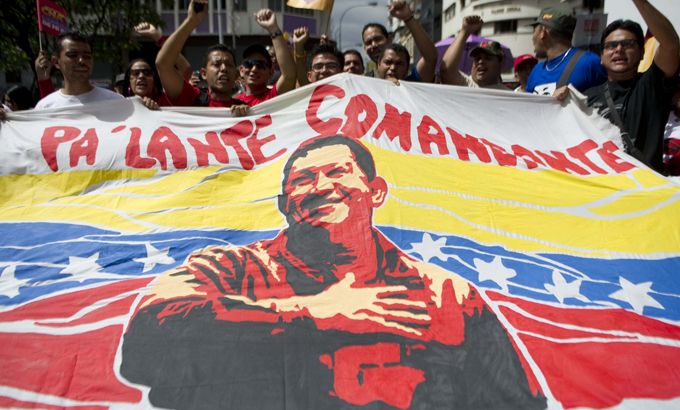
Uncertainty looms over Venezuela
As Hugo Chavez’s inauguration for another term as president has been postponed, how does his illness impact the country?
Thousands of supporters have rallied outside the presidential palace in Caracas to show their support for Hugo Chavez who is fighting cancer in a Cuban hospital.
|
“It’s an opposition trying to take advantage of the situation to undermine the legitimacy of the government, but they don’t have a constitutional case or a legal basis for it at all.“ – Mark Weisbrot, the co-director of the Center for Economic and Policy Research |
On Wednesday, Venezuela’s Supreme Court ruled his swearing-in for another term as president of Venezuela could be postponed in order to give Chavez time to recover.
Opposition leader, Henrique Capriles, has protested the decision but urged his supporters to stay off the streets.
He said: “It’s regrettable, because institutions should not respond to the interests of a party. After all, the fight was over respecting the constitution, not about a change of government, be sure of that, I want to be clear on that …. Make no mistake, none of these leaders were elected on October 7. There is one leader from the opposition party, and that’s the president of the country, and he was elected on October 7. Don’t confuse things.”
In the meantime Chavez’s anointed successor, vice-president Nicolas Maduro, is running the country. The opposition says this violates the constitution and Maduro should leave office on Thursday when the current presidential term expires.
|
“While there is a substantial minority that wants more information or force an earlier election, the majority of Venezuelans at this point in time want to move forward and are kind of content that at least for a while Maduro runs the country.“ – Daniel Hellinger, a professor of political science at Webster University |
They argue that the leader of the national assembly, Diosdado Cabello, who is another Chavez ally, should take temporary charge until new elections can be organised within 30 days.
But Maduro says: “The president is currently functioning as the Republic’s president, head of state, head of the government, so at no point in time has he been absent. On the contrary, it does not even qualify as a temporary absence nor permanent absence. On the contrary, it opens the opportunity for flexibility because the popular will [of the people] – the general will of the nation – is being respected, and it opens the flexibility for the Supreme Court, jointly with the head of state, to coordinate the moment of formally carrying out the inauguration.”
So what does Chavez’s illness mean for Venezuela’s future? Is the ruling creating deeper political divisions in the country? And what would happen to Venezuela after Chavez?
Inside Story Americas is joined by guests: Mark Weisbrot, the co-director of the Center for Economic and Policy Research; Juan Carlos Hidalgo, a Latin America policy analyst at the Cato institute; and Daniel Hellinger, a professor of political science at Webster University and author of a number of books on Venezuela.
|
“We don’t know the situation with Chavez’s health, we don’t know if he is alive or how serious his condition is, we haven’t heard from him in a month. His previous presidential term expired today and a new presidential term starts today. And with his presidential term expired the legitimacy of people serving under him, including Nicolas Maduro. Nicolas Maduro was the vice-president for the previous term but he cannot continue ruling Venezuela under a new term.” Juan Carlos Hidalgo, a Latin America policy analyst at the Cato institute |